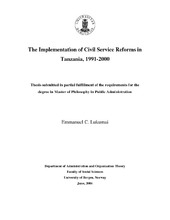The Implementation of Civil Service Reforms in Tanzania, 1991-2000
Master thesis
Permanent lenke
https://hdl.handle.net/1956/1560Utgivelsesdato
2006Metadata
Vis full innførselSamlinger
- Department of Government [457]
Sammendrag
The present thesis deals with civil service reforms implemented in Tanzania in between 1991-2000. It aims at assessing whether the reforms achieved the intended objectives of “smaller, affordable, well compensated, efficient and effective performing civil service” (Caulfield, 2004: 233). To this end, the discussion starts by explaining the overall move for reform globally and then narrows its scope and deals with assessing the factors that led to achievement or failure of the process in the Tanzanian context. Drawing from the implementation theory of Van Meter and Van Horn (1975), independent variables are considered to influence the dependent variables (reform measures) and lead to success or failure. Independent variables discussed are standard and objectives, resources, Inter-organizational communication and enforcement activities, characteristics of implementing agencies, disposition of implementers, and economic, social and political conditions. The reform measures selected and assessed are remuneration, recruitment, retrenchment, capacity building, and government expenditure.In order to contextualize the research issue, I explained the history of reforms in Tanzanian since independence in 1961 and as well, the composition of the civil service.The research presents data collected from the field using a qualitative (case study) approach which was gathered through written documents and some interview that was possible accessed. The data collected draws a complex picture. It indicates that some reform measures were successful (e.g. retrenchment) whiles others (e.g. remuneration, government expenditure and capacity building) were unsuccessful. Recruitment was more of a paradox as success in recruiting the right candidates was frustrated by high turnover of competent workers due to poor remuneration which cannot motivate skilled worker to remain in government employment.A number of factors that impeded the achievement of the process have been identified including limited resources, poor communication of the reform objective, weak political support of reforms by the government that was in power before the 1995 election, and lack of local ownership in reform. In this general assessment, the reform was unsuccessful and the discussion concludes with suggestion of what should future reformers should strive to do for successful reform in the future.
Utgiver
The University of BergenOpphavsrett
The authorCopyright the author. All rights reserved
